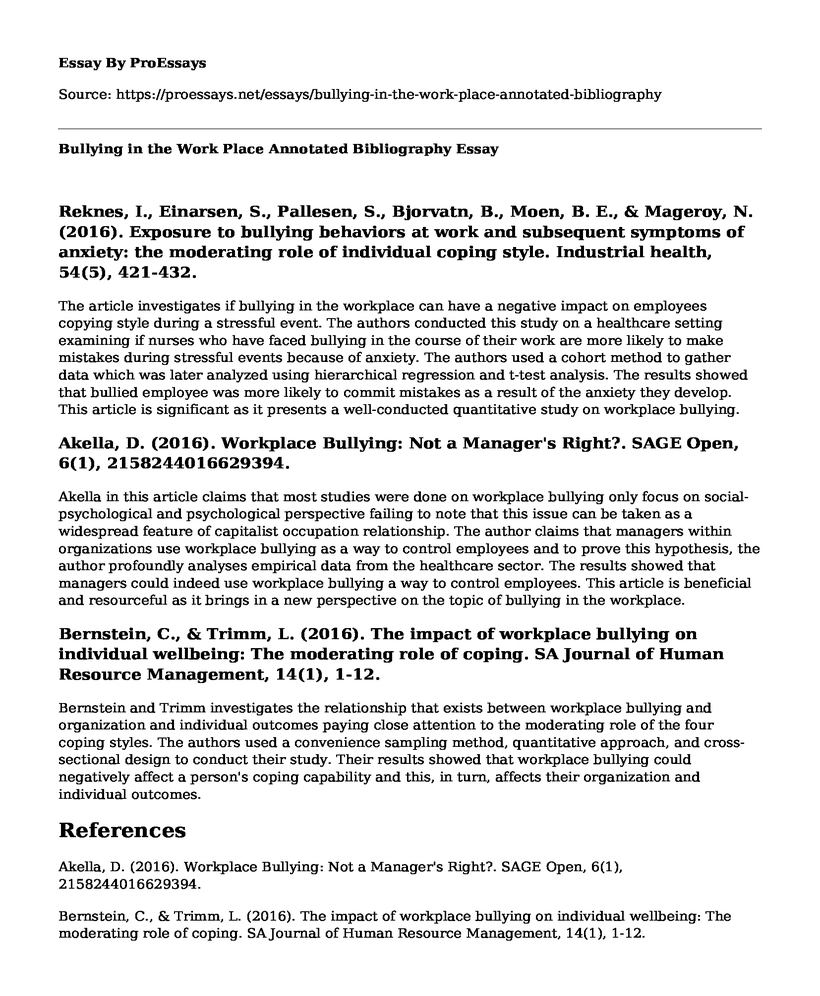Reknes, I., Einarsen, S., Pallesen, S., Bjorvatn, B., Moen, B. E., & Mageroy, N. (2016). Exposure to bullying behaviors at work and subsequent symptoms of anxiety: the moderating role of individual coping style. Industrial health, 54(5), 421-432.
The article investigates if bullying in the workplace can have a negative impact on employees copying style during a stressful event. The authors conducted this study on a healthcare setting examining if nurses who have faced bullying in the course of their work are more likely to make mistakes during stressful events because of anxiety. The authors used a cohort method to gather data which was later analyzed using hierarchical regression and t-test analysis. The results showed that bullied employee was more likely to commit mistakes as a result of the anxiety they develop. This article is significant as it presents a well-conducted quantitative study on workplace bullying.
Akella, D. (2016). Workplace Bullying: Not a Manager's Right?. SAGE Open, 6(1), 2158244016629394.
Akella in this article claims that most studies were done on workplace bullying only focus on social-psychological and psychological perspective failing to note that this issue can be taken as a widespread feature of capitalist occupation relationship. The author claims that managers within organizations use workplace bullying as a way to control employees and to prove this hypothesis, the author profoundly analyses empirical data from the healthcare sector. The results showed that managers could indeed use workplace bullying a way to control employees. This article is beneficial and resourceful as it brings in a new perspective on the topic of bullying in the workplace.
Bernstein, C., & Trimm, L. (2016). The impact of workplace bullying on individual wellbeing: The moderating role of coping. SA Journal of Human Resource Management, 14(1), 1-12.
Bernstein and Trimm investigates the relationship that exists between workplace bullying and organization and individual outcomes paying close attention to the moderating role of the four coping styles. The authors used a convenience sampling method, quantitative approach, and cross-sectional design to conduct their study. Their results showed that workplace bullying could negatively affect a person's coping capability and this, in turn, affects their organization and individual outcomes.
References
Akella, D. (2016). Workplace Bullying: Not a Manager's Right?. SAGE Open, 6(1), 2158244016629394.
Bernstein, C., & Trimm, L. (2016). The impact of workplace bullying on individual wellbeing: The moderating role of coping. SA Journal of Human Resource Management, 14(1), 1-12.
Reknes, I., Einarsen, S., Pallesen, S., Bjorvatn, B., Moen, B. E., & Mageroy, N. (2016). Exposure to bullying behaviors at work and subsequent symptoms of anxiety: the moderating role of individual coping style. Industrial health, 54(5), 421-432.
Cite this page
Bullying in the Work Place Annotated Bibliography. (2022, Aug 23). Retrieved from https://proessays.net/essays/bullying-in-the-work-place-annotated-bibliography
If you are the original author of this essay and no longer wish to have it published on the ProEssays website, please click below to request its removal:
- Leading Versus Managing Essay
- Paper Example on Leadership and Management
- Ethics of a Probation Officer Essay
- Essay Sample on Internet Addiction
- The Story Behind Each Cup of Coffee Essay Example
- Essay Sample on Rape Culture: Believing Violence is Sexy and Sexy is Violent
- Annotated Bibliography on Cyberbullying & Traditional Bullying







